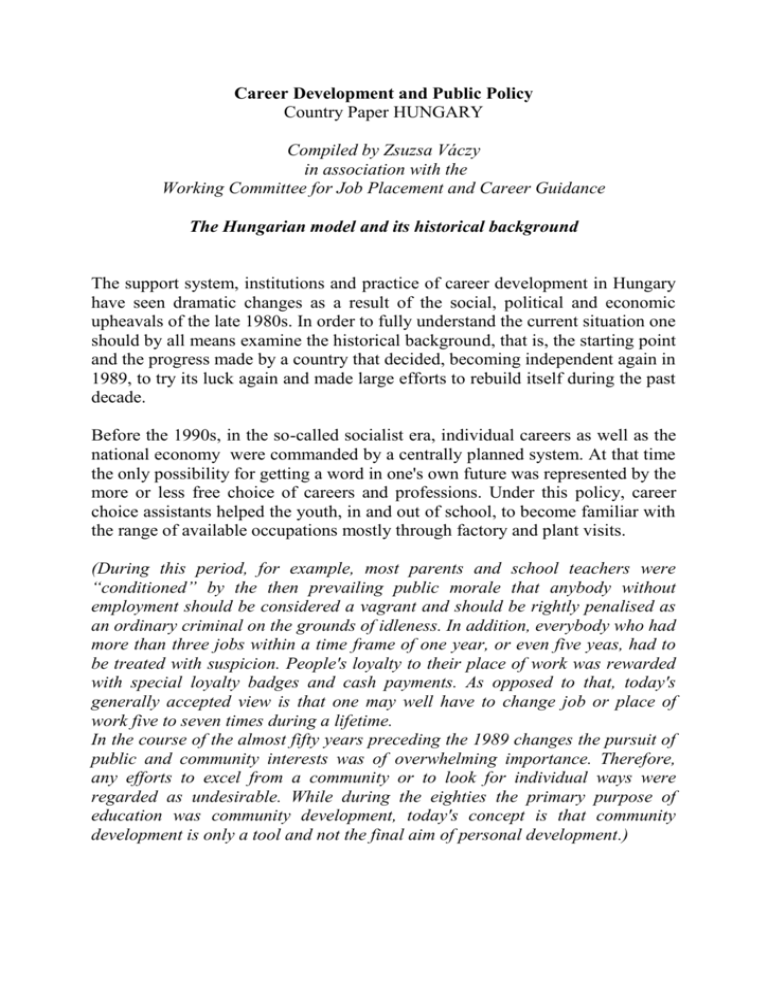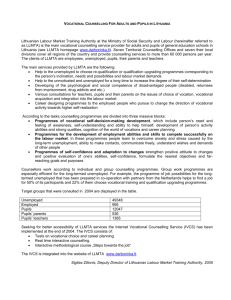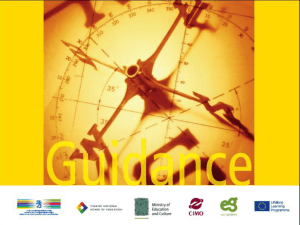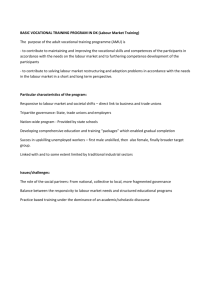The Hungarian model and its historical background
advertisement

Career Development and Public Policy Country Paper HUNGARY Compiled by Zsuzsa Váczy in association with the Working Committee for Job Placement and Career Guidance The Hungarian model and its historical background The support system, institutions and practice of career development in Hungary have seen dramatic changes as a result of the social, political and economic upheavals of the late 1980s. In order to fully understand the current situation one should by all means examine the historical background, that is, the starting point and the progress made by a country that decided, becoming independent again in 1989, to try its luck again and made large efforts to rebuild itself during the past decade. Before the 1990s, in the so-called socialist era, individual careers as well as the national economy were commanded by a centrally planned system. At that time the only possibility for getting a word in one's own future was represented by the more or less free choice of careers and professions. Under this policy, career choice assistants helped the youth, in and out of school, to become familiar with the range of available occupations mostly through factory and plant visits. (During this period, for example, most parents and school teachers were “conditioned” by the then prevailing public morale that anybody without employment should be considered a vagrant and should be rightly penalised as an ordinary criminal on the grounds of idleness. In addition, everybody who had more than three jobs within a time frame of one year, or even five yeas, had to be treated with suspicion. People's loyalty to their place of work was rewarded with special loyalty badges and cash payments. As opposed to that, today's generally accepted view is that one may well have to change job or place of work five to seven times during a lifetime. In the course of the almost fifty years preceding the 1989 changes the pursuit of public and community interests was of overwhelming importance. Therefore, any efforts to excel from a community or to look for individual ways were regarded as undesirable. While during the eighties the primary purpose of education was community development, today's concept is that community development is only a tool and not the final aim of personal development.) The institutional network designed to assist career choice, choice of school and counselling within the framework of career choice institutes of the counties (i.e. out of school) was set up in the 1960s. From the seventies onwards, psychological and pedagogical counselling services were introduced to help young individuals in their career choice decisions. The former services were provided by the psychologists of the career choice institutes during their school visits, while pedagogical counselling was given, also on-site, jointly by one of the teachers of the school (who was doing this not as a full-time occupation) and an expert of the career choice institute of the county in question. Their work was supervised and co-ordinated by the National Career Choice Institute. In the eighties, when certain political and economic changes were already visible, the issue of career choice was transferred for its importance to the authority of the Ministry of Education. The task of supervision and coordination was then assigned to the National Pedagogical Institute, while the actual work became the responsibility of the pedagogical institutes of the counties. In addition to that, the primary and secondary school pupils were supported, beyond their families, in their career choice by their form-masters and, eventually, the career choice study circles of their school. As a result of the social and economic restructuring of the nineties, the meaning of individual careers has been greatly revalued. The market economy that followed the old centrally planned economy has caused an unprecedented collapse of the industrial and agricultural markets. This led to the emergence of unemployment, a term previously unknown in Hungary, which soared to a national average of 13% in the early 1990s. The changes brought along further changes: the informative pedagogical work was completed with such new tools as personality tests, individual skill assessments and counselling programmes. In the case of primary schools it is the duty of the form-masters and the career choice assistants to provide career and school choice counselling. The career choice assistance given by the secondary schools, which prepare their pupils mostly for further education, is still based primarily on written and verbal information. Nevertheless, there is a clearly emerging wish to integrate career choice and job placement counselling into school education, given the ever strengthening link and interaction between education and economy, that is schools and workplaces. Under the Hungarian school system, those finishing their primary school studies (eight years) may choose a grammar school (general education) or go to a vocational school or a vocational secondary school (technical training). Form 9 and 10 of the vocational schools provide general education, which is followed by 0.5-3 years of technical training ending with a qualification. Most qualifications require two years of technical training. As opposed to that, the vocational secondary schools provide general education in forms 9-12 ending with a GCE (general certificate of education), and vocational training starts only afterwards. Started several years ago, the World Bank's "Vocational youth training modernisation" programme has given the possibility and frameworks to develop – under a new and modern vocational training model and method – also the career choice and job placement counselling services: started first in Hungary in the academic year 1993/94, the career orientation subprogramme was based on the independent skills development of the pupils; in academic year 1998/99 a new World Bank programme was launched with the aim of developing modern qualifications in compliance with the labour market demands and ensuring thorough preparation for the entry to the labour market; set up in 2000 under this programme, the Working Committee for Job Placement and Career Guidance has been operating with a pro rata representation of the educational and the labour market institutions. Its aim is to work out an overall unified strategy, to develop, adapt, test and integrate new methods, programmes and teaching materials, as well as to prepare the teachers and consultants on how to use the new methods and assist with the job placements. The government’s education policy provides various forms of support – including legislative frameworks – for these efforts. For instance, under the Public Education Act amended in summer 1999 with the aim of supporting career development, two qualifications can be obtained free of charge (instead of only one as was the case previously). Still under this Act, as of September 2000 the vocational schools may teach vocational preparation and foundation subjects in forms 9 and 10, while the vocational secondary schools may introduce vocational orientation, preparation and trade group training in forms 9-12. This forms part of the framework curriculum and offers good opportunity for ongoing career development. The newly introduced measures and forms are able to better prepare the pupils for their career choice decisions. The range of services has expanded: labour market organisations have been established for assisting the employees and meeting the employers' needs. Part of the network is the National Research Centre for Labour Market Methodologies assisted by the labour centres in the counties and in the capital. Under the auspices of such centres another agency, the Employment Information Agency (FIT) has been set up to provide general career choice information, further training information in case of career modification, employment information, as well as custom-tailored counselling for both young people and adults. Furthermore, the National Employment Foundation regularly supports the organisation of career choice meetings for students, parents and schools all over the country. At the start of the new millennium, the education policy of the government stresses the important need to create the best possible link between career choice/development and the demands and to generate a suitable legislative framework for career planning/development. Therefore, the Public Education Act and other legislation stipulate, among others, such rights and obligations that have career development implications as well: the parents, together with their children, will exercise the right of school choice, according to the pupils’ fields of interest, skills and talent; the vocational preparation and foundation training in form 9 and 10 of the vocational schools will be determined by the framework curriculum; the vocational secondary schools will conduct vocational orientation, preparation and trade group training in forms 9-12; the capabilities, skills and orientation of the students shall be examined by a further education and career choice expert holding a university diploma; the local government shall arrange for further education and career choice counselling as well as professional pedagogical services; new qualifications have been introduced: courses for educational counselling and career orientation further training; the government will set up a national information system in the field of public education; the National Board for Vocational Training (consisting of the representatives of the government, the employers and the employees) will review, on an annual basis, the chances of employment of the new entrants to the labour market; the employment policy guidelines will also be applicable to the field of career choice and career modification. Conclusion The new model for the development of career counselling is just being built in Hungary. Partly retaining some former practices and partly searching for novel ways, the new model wishes to meet the newly emerging demands. It would be rather difficult to make a separate analysis of the three main groups and their forms (preventive, reactive and remedial) as they have a joint and almost overall presence in most of the cases. For instance, subjects like self-knowledge, selfassessment, job finding strategies, etc. should be taught not only to young people but also to those left unemployed at the age of 50 or so. In some areas (e.g. education), however, the main purpose should be prevention and preparation. Targets and outcomes As to the quality outcomes, the following two areas are identified: – demands of the individuals at micro level; – demands of the labour market at macro level. Naturally, the quality outcomes appear as an interaction of the above areas, following the changes and adapting to the new needs in a flexible manner. An individual career is considered successful if it is in line with the individual's efforts, skills and capabilities and if there is a demand for the individual's qualification on the market. Thus our co-operation with the National Life/Work Center, in the frameworks of which we were able to get acquainted with the Blueprint for Life/Work Designs and the Real Game programmes, is of utmost importance because these programmes contain such targets and outcomes in a clearly adaptable form. Hungary is expected to join the EU in 2 or 3 years and this fact requires the further improvement and EU harmonisation of our career choice/planning practice. According to statistics from Hungary and the EU member states, those having higher qualifications stand a much better chance to remain on the labour market and to have a safe future than people with low or no qualification at all. The future for individuals will mean a lifelong process of learning based on their original skills. In addition to playing a pivotal role in career planning, this will also be a major requirement in the ever changing society. Possessing a good general knowledge will become a priority with a strong emphasis on understanding the meaning of things, creativity, opinion forming, judgement and decision-making ability. Thus it is advisable to take such factors as a basis for the development of vocational aptitude and capabilities. Therefore, as far as the individual is concerned, the main purpose of the counselling activity is to help the individual become familiar with his own personality, skills and capabilities and use this information in his career choice, in the conduct of an optimistic life and in the development of his knowledge. In addition, the individual should be prepared for the lifelong process of learning and for the adjustment to new requirements. He should be familiar with the methods and strategies of job finding. Also, he should be able to interpret the changes in his career not as failures but as new and exciting challenges. As far as the macro-social level is concerned, a development programme, regarded also as a major human resource development component and as a national priority, has been launched that aims at "producing" versatile, flexible and well-prepared individuals on the labour market so that they can efficiently contribute to the implementation of our social and economic objectives. This programme intends to raise and adjust the level of education and schooling to the labour market needs, as well as to improve the conditions for and access to lifelong learning for all age groups. The above objectives clearly match those European expectations that Hungary wants to meet upon its EU accession and that greatly determine the issue of career development. The most important of these are as follows: acquisition of new knowledge to increase the recognition of skills and the level of mobility; increased emphasis on training based on work experience; the importance of foreign language skills in order to speed up the take-over of the technical and business novelties and to live up to our role played as one of the major transit countries in Europe. Clear evidence supports the fact, also in the case of Hungary, that those who have been given career consulting through labour agencies, education institutes or corporate training courses are more successful in finding a job, leading a trouble-free life, solving problems and handling crisis situations. However, the independently functioning services, although representing a good professional level, are unable to work really efficiently as the counselling, career choice, vocational orientation and job placement operations are not integrated yet into a uniform system. In lack of real co-operation among the various entities, their services are not interrelated and remain isolated. The objective is, therefore, to establish an integrated national strategy and system of requirements so that the educational system, the labour organisation and the family support network will complement and help each other and operate as interrelated modules in the future. It is clear from the foregoing that there are only limited national surveys dealing directly with career counselling and development. However, the available employment research analyses, follow-up studies and ongoing measurements may be used also in this field. Actually, the various data (number, age, sex and qualification) and schooling indicators of the population are continuously recorded and analysed by the training institutions, government sources and independent researchers. Nevertheless, the indicator system just under preparation (in line with the applicable EU standards and the emerging national strategy) will enable its future users to make even more sophisticated analyses and international comparisons. As a matter of fact, the currently available indicators and analyses can be easily used to monitor the life of the highest risk categories (i.e. unemployed young people; long-term labour market leavers; women; people disadvantaged for their welfare, physical or mental problems; ethnic minorities) in order to work out the corresponding action plans, government measures and public policy programmes. Costs and benefits During the past few years Hungary has made huge efforts to restructure its entire economic and political system. The resulting progress is clearly visible. It is also visible, however, that the changes meant a real shock and a heavy burden to the population. Actually, not all individuals and segments of the society can always adjust to the new conditions.The adjustment is a long process and there are victims, too. The last decade saw the establishment of brand new institutions in the field of career development. As the provision of the relevant services belong to the competence of several ministries, the related funds arrive from numerous budgetary and extrabudgetary sources. This way most of the services are featured not as independent elements but as part of some training. Consequently, the expenses are rather difficult to quantify and summarise. However, the following example might well describe the current financing system of the whole area: in 1999 the budgetary expenses of the Hungarian public education system amounted to HUF 590,066 million, including most of the career development expenditure. This accounted for some 5.6% of the GDP. In particular, the expenses of the institutions supporting youth and adult career development were as follows: The following major career development institutions fall under the direct supervision of the Minister for Education: schools, professional service institutions (pedagogical institutes, education counselling agencies, career choice counselling agencies) and the institutions not belonging to the school system (including the regional workforce development and training centres and, indirectly, the training companies, the non-profit entities and the civil organisations involved in career orientation activities). Financing sources: funds from the financing bodies of public education institutions (i.e. mostly from the local governments), central budgetary allocations and own revenues. The following organisations and institutions fall under the supervision of the Minister for Economic Affairs: the labour network (labour centres in the counties/capital, labour offices, youth agencies, Employment Information Agency (FIT), professionalforums of career choice in the counties/capital). Financing sources: Employment Section of the Labour Market Fund; allocations from the National Employment Foundation. The Minister for Welfare and Family Affairs supervises the career orientation counselling activity of the professional rehabilitation service provided for people with altered (limited) working ability. Financing sources: Rehabilitation Section and Employment Section of the Labour Market Fund. It goes without saying that the expenditures represent only a part of the investment that makes the high service levels possible. It would be extremely difficult to quantify those expenditures that finance the technical conditions implemented in the institutions and the continuous training and further training of the consulting and engineering personnel in charge of the new services. It would be equally difficult to quantify the results and the benefits. Actually, the changes of attitude taking place in the minds represent hardly quantifiable and slow-return investments. Similarly, it is impossible to measure the values that will be created through the emergence of the new approach and the accumulation of the experiences. Co-operation and division of roles As it is clear from the foregoing, the career development services represent mostly the responsibilities of the government and public institutions. However, due to the division of such responsibilities, ongoing co-operation is needed among the three competent ministries. Nevertheless, some social and business organisations (employers, employees, civil sector) also play a considerable role. In addition to providing a direct relationship (dialogue) between the worlds of education and work, the tripartite organisation (OSZT) established in the late eighties has a versatile role: mediates the demands of the economy (labour market), provides continuous feedback on the efficiency of education, plays an important role in the process of decision-making and fund allocation, as well as controls the efficient use of funds. As the design and efficiency of the career development tasks and services also go through this "filter", it really plays a substantial role. However, as a result of the effort made by large groups of the society, many local civil organisations have been formed during the past few years in order to help people's career and conduct of life. One of the major demands advocated by these organisations is that people should be prepared for a successful life right from childhood. Such organisations include, among others, the various associations of parents, families, consultants and sister professions. Obviously, the emerging institutions and organisations will be able to meet the expectations of the society and to work more efficiently if they can help and cooperate with each other for the implementation of the already mentioned uniform strategy and objectives. Fortunately, all conditions required for such work have already been established in Hungary. Currently, we are in the stage of preparation and decisions, when the tasks and roles are being defined precisely. It is only natural that in this very stage the weakest link of the chain is the school or, in other words, the system of organised education. It should be noted that in Hungary, the parents (families) are unable to give proper support for the career development of their children as they do not have experiences of their own, while those parents who have some experiences (e.g. the unemployed) may adversely influence or even block the decisions of their children. Actually, the social disadvantages may lead, in many places and instances, to the repetition of the parents' failure in their children's life. This explains the reason why the school (organised education) has a much greater responsibility in this regard than the education system of other, more developed countries. As a matter of fact, the school in Hungary has to give much greater support in order to make up for the lack of family and social experience-based natural flow of knowledge and traditions. Requirements to be met by the professionals Just some fifteen years ago it was the duty of psychologists, assisted by pedagogical experts in the various institutions, to provide career capability and counselling services in Hungary. At the same time, the tasks associated with further education and school choice were mainly managed by the form-masters of the pupils in question. Fortunately, the number of professionals working in this field has multiplied and, in addition to teachers and psychologists, such new professions appeared as that of consultants or social workers. Obtaining degrees in or practising such professions requires a university diploma. Currently, such consultants are trained at two universities in Hungary but there are several higher education institutions that organise courses or further training in this field. Some teachers' further training institutions also offer similar courses. However, according to the experiences accumulated so far, most qualified teachers prefer other further training topics than the ones mentioned above, at least for the time being. Although the headmasters and form-masters recognise the importance of career development, they are not precisely aware of the opportunities. Besides that they do not yet have enough professionals, tools and programmes for such purpose. Therefore, the task is a combined one: in the training and further training of the teachers a major emphasis should be placed on their preparation for and involvement in the process of lifelong career development starting from as early as one's childhood. At the same time, a good range of high-quality teaching materials, programmes and methods should be offered for the schools, together with safeguarding the availability of the necessary funds and timeframe in the curriculum.








